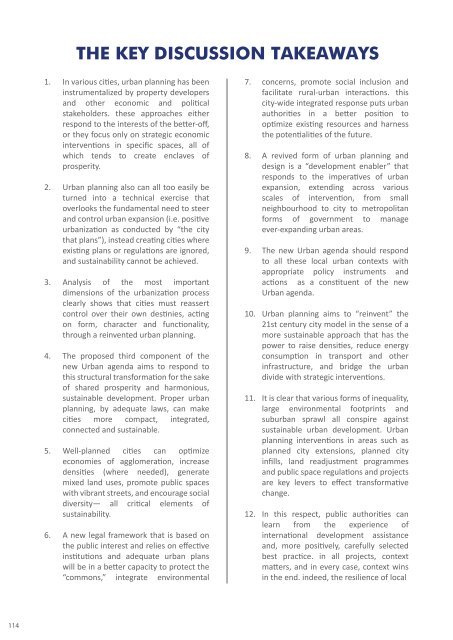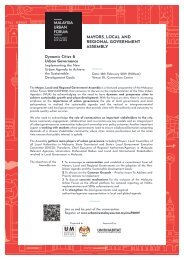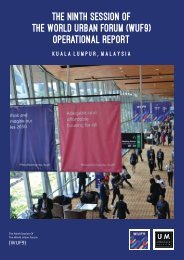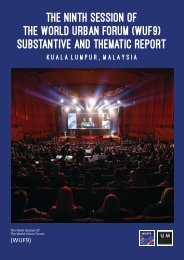WUF9 Substantive Report-s
Create successful ePaper yourself
Turn your PDF publications into a flip-book with our unique Google optimized e-Paper software.
THE KEY DISCUSSION TAKEAWAYS<br />
1.<br />
2.<br />
3.<br />
4.<br />
5.<br />
6.<br />
In various cies, urban planning has been<br />
instrumentalized by property developers<br />
and other economic and polical<br />
stakeholders. these approaches either<br />
respond to the interests of the beer-off,<br />
or they focus only on strategic economic<br />
intervenons in specific spaces, all of<br />
which tends to create enclaves of<br />
prosperity.<br />
Urban planning also can all too easily be<br />
turned into a technical exercise that<br />
overlooks the fundamental need to steer<br />
and control urban expansion (i.e. posive<br />
urbanizaon as conducted by “the city<br />
that plans”), instead creang cies where<br />
exisng plans or regulaons are ignored,<br />
and sustainability cannot be achieved.<br />
Analysis of the most important<br />
dimensions of the urbanizaon process<br />
clearly shows that cies must reassert<br />
control over their own desnies, acng<br />
on form, character and funconality,<br />
through a reinvented urban planning.<br />
The proposed third component of the<br />
new Urban agenda aims to respond to<br />
this structural transformaon for the sake<br />
of shared prosperity and harmonious,<br />
sustainable development. Proper urban<br />
planning, by adequate laws, can make<br />
cies more compact, integrated,<br />
connected and sustainable.<br />
Well-planned cies can opmize<br />
economies of agglomeraon, increase<br />
densies (where needed), generate<br />
mixed land uses, promote public spaces<br />
with vibrant streets, and encourage social<br />
diversity— all crical elements of<br />
sustainability.<br />
A new legal framework that is based on<br />
the public interest and relies on effecve<br />
instuons and adequate urban plans<br />
will be in a beer capacity to protect the<br />
“commons,” integrate environmental<br />
7.<br />
8.<br />
9.<br />
10.<br />
11.<br />
12.<br />
concerns, promote social inclusion and<br />
facilitate rural-urban interacons. this<br />
city-wide integrated response puts urban<br />
authories in a beer posion to<br />
opmize exisng resources and harness<br />
the potenalies of the future.<br />
A revived form of urban planning and<br />
design is a “development enabler” that<br />
responds to the imperaves of urban<br />
expansion, extending across various<br />
scales of intervenon, from small<br />
neighbourhood to city to metropolitan<br />
forms of government to manage<br />
ever-expanding urban areas.<br />
The new Urban agenda should respond<br />
to all these local urban contexts with<br />
appropriate policy instruments and<br />
acons as a constuent of the new<br />
Urban agenda.<br />
Urban planning aims to “reinvent” the<br />
21st century city model in the sense of a<br />
more sustainable approach that has the<br />
power to raise densies, reduce energy<br />
consumpon in transport and other<br />
infrastructure, and bridge the urban<br />
divide with strategic intervenons.<br />
It is clear that various forms of inequality,<br />
large environmental footprints and<br />
suburban sprawl all conspire against<br />
sustainable urban development. Urban<br />
planning intervenons in areas such as<br />
planned city extensions, planned city<br />
infills, land readjustment programmes<br />
and public space regulaons and projects<br />
are key levers to effect transformave<br />
change.<br />
In this respect, public authories can<br />
learn from the experience of<br />
internaonal development assistance<br />
and, more posively, carefully selected<br />
best pracce. in all projects, context<br />
maers, and in every case, context wins<br />
in the end. indeed, the resilience of local<br />
114






